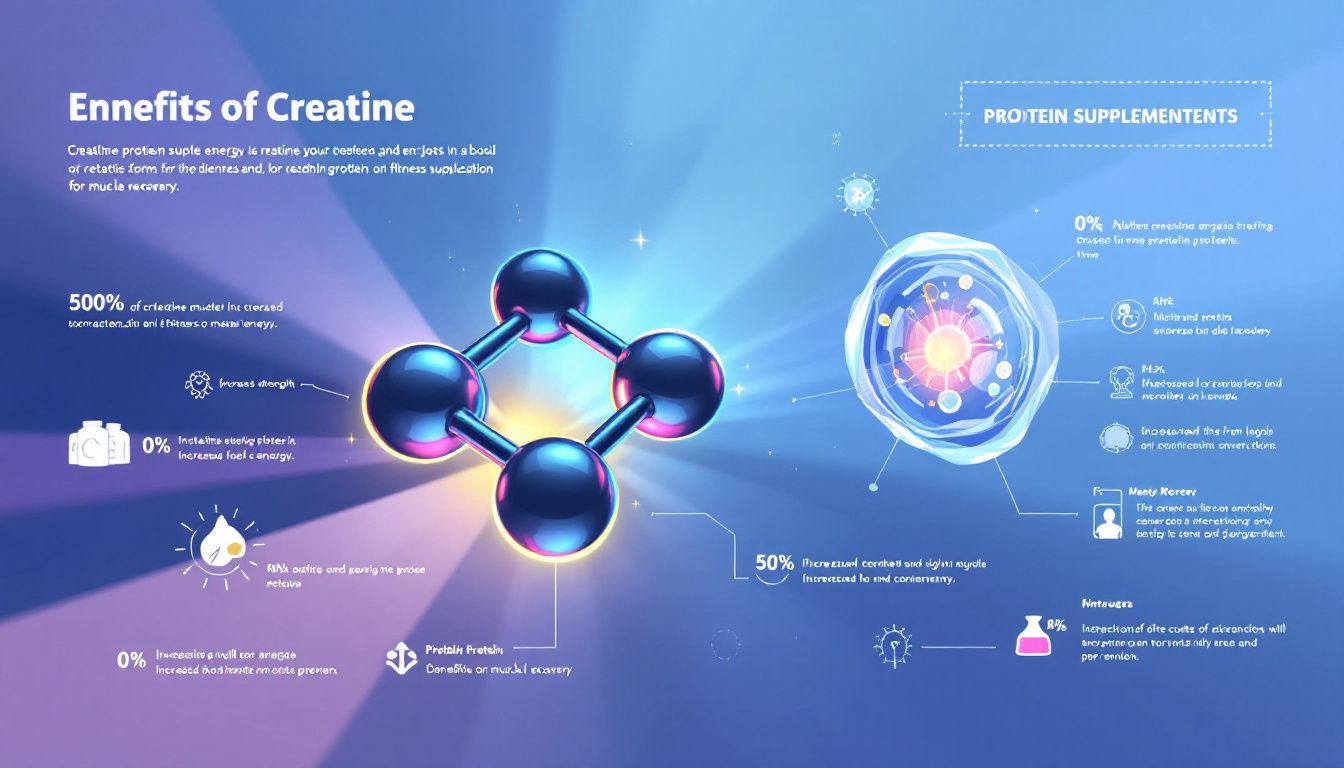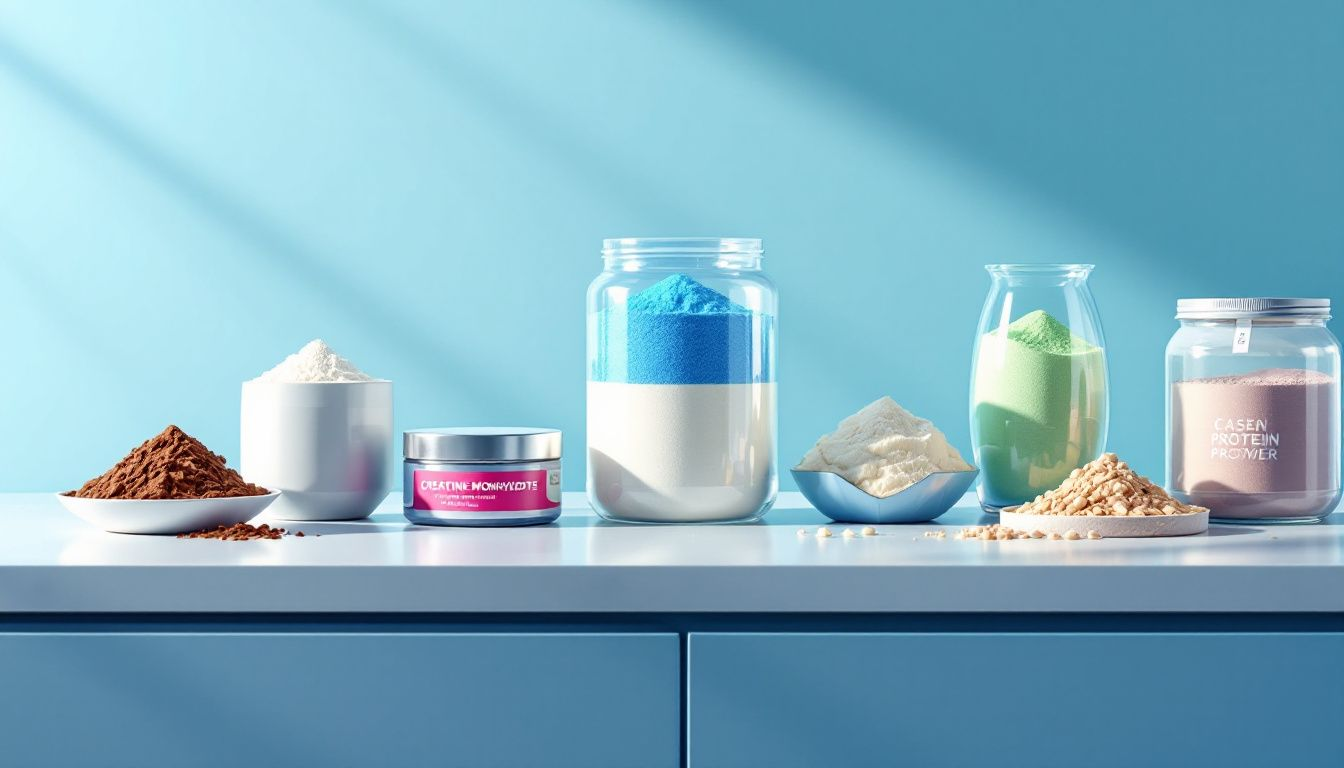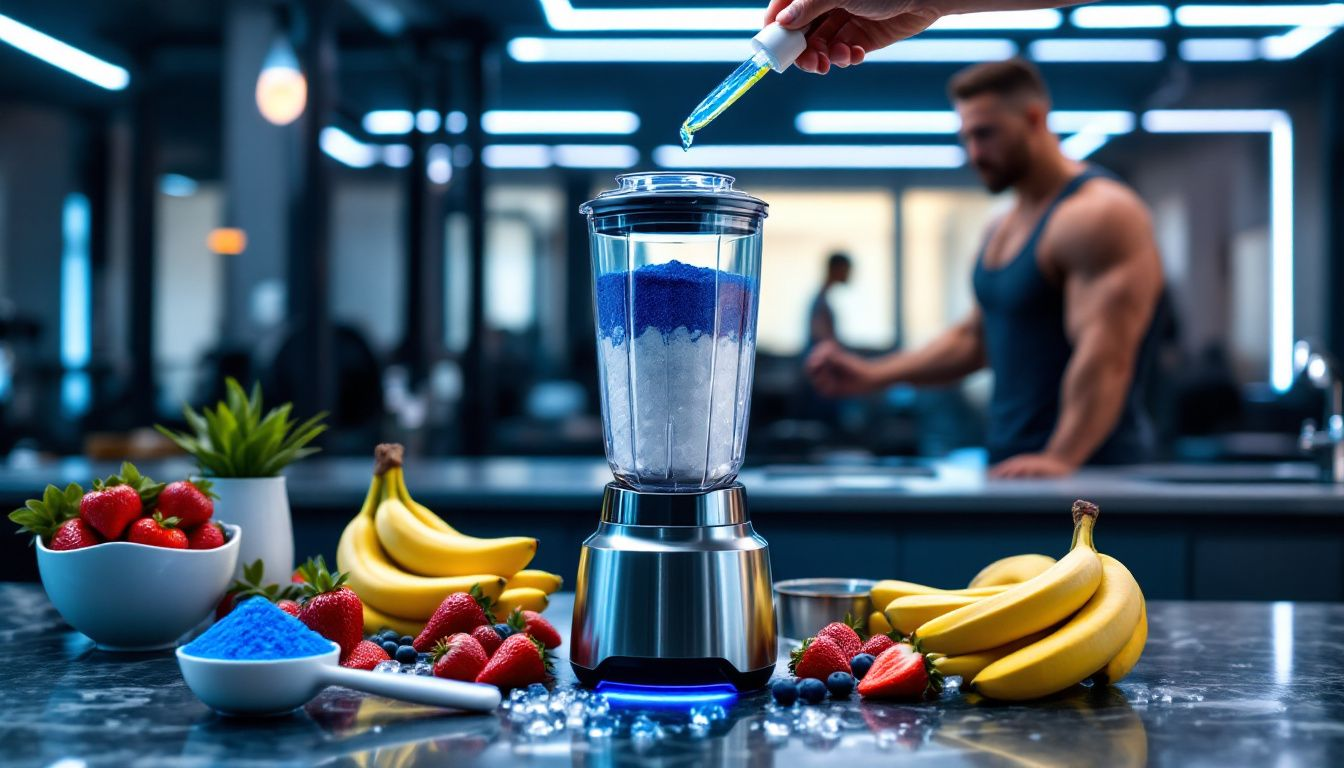

Are you trying to decide between creatine vs protein for better muscle growth? This article will help you understand the benefits of each supplement and how they impact your performance. We’ll cover how creatine supports short bursts of intense effort, while protein aids muscle recovery and growth. By the end, you’ll know which supplement—or combination—fits your fitness goals.
Creatine boosts energy production during high-intensity workouts, enhancing exercise performance and aiding muscle growth.
Protein powder supports muscle recovery and growth by increasing muscle protein synthesis, making it an essential supplement for athletes.
Combining creatine and protein powder can enhance overall muscle strength and endurance, maximizing the benefits of both supplements.

Creatine is an amino acid that’s naturally present in your muscles, playing a crucial role in energy production. Your body produces creatine from three amino acids: arginine, glycine, and methionine, with about one gram synthesized daily by the liver, kidneys, and pancreas. This naturally occurring compound is stored in your muscles as phosphocreatine, which serves as a primary energy source during high-intensity workouts.
When it comes to creatine supplements, creatine monohydrate is the most commonly used form. Derived from L-arginine, glycine, and L-methionine, creatine monohydrate is highly effective in boosting energy levels and enhancing exercise performance. It’s especially useful for activities requiring short bursts of intense effort, like weightlifting or sprinting.
Supplementing with creatine increases your muscle’s phosphocreatine stores, leading to more energy production during high-intensity exercise. This boost enhances your overall exercise capacity, enabling you to push through tough workouts and attain better results. Creatine is a valuable addition to your supplement regimen, whether your goal is muscle growth, improved strength, or enhanced performance.

Protein powder is a versatile supplement. It can be derived from different sources such as whey, casein, soy, pea, and rice. It’s designed to enhance muscle recovery and support muscle growth by providing a convenient and concentrated source of protein. For those who struggle to get enough protein from their diet alone, protein powders can fill dietary gaps and ensure adequate protein intake.
A primary benefit of protein powder is its role in enhancing muscle protein synthesis, crucial for muscle repair and growth. Athletes, bodybuilders, and those engaged in intense physical activities often rely on protein supplements to meet their protein needs and optimize performance. Typically consumed in the form of a protein shake, these supplements can be mixed with water, milk, or other liquids for a quick and easy protein boost.
A typical serving of protein powder provides about 20-30 grams of high-quality protein, making it an efficient way to increase your daily protein intake. Whether you’re using a whey protein supplement or a plant-based option, protein powders offer a convenient solution to support your muscle-building goals.
Creatine functions by generating adenosine triphosphate (ATP). ATP is the main energy source for muscle contractions during high-intensity workouts. When you engage in activities that require short bursts of energy, such as lifting heavy weights or sprinting, your muscles rely heavily on ATP. Creatine helps maintain and regenerate ATP levels, allowing you to sustain high-intensity efforts for longer periods.
In muscle cells, creatine acts as a crucial energy buffer, ensuring that ATP concentrations remain high during intense physical activities. Increasing phosphocreatine levels in your muscles, creatine supplementation supports rapid ATP regeneration, essential for prolonged high-intensity exercise. This enables you to push harder and perform better during workouts.
The benefits of creatine supplementation go beyond just energy production. By enhancing your exercise performance, creatine helps you achieve better results in terms of muscle growth and strength. Whether you’re looking to improve your anaerobic exercise performance or simply want to boost your energy levels during workouts, taking creatine can make a significant difference.
Protein powder plays a vital role in muscle growth by supporting muscle protein synthesis. While your overall daily protein intake is crucial, consuming protein around your workouts can optimize muscle recovery and growth. Consuming protein shortly before or after exercise significantly boosts muscle protein synthesis, aiding in muscle tissue repair and development.
Whey protein, in particular, is highly effective in enhancing muscle recovery due to its rapid absorption and high leucine content. Leucine is an essential amino acid that plays a key role in triggering muscle protein synthesis. Incorporating whey protein into your post-workout routine maximizes muscle recovery and growth potential.
Research has consistently shown that protein supplementation around resistance exercise can enhance muscle protein synthesis, leading to improved muscle gains and overall performance. Ensuring adequate protein intake, whether from whey or another high-quality source, is essential for achieving fitness goals.
Creatine offers numerous benefits for muscle growth. Creatine enhances muscle mass by drawing water into muscle cells, promoting protein synthesis and increasing muscle volume. This process not only leads to bigger muscles but also supports the repair and growth of muscle fibers.
In addition to increasing muscle mass, creatine has been shown to enhance muscle strength. Boosting anabolic hormone levels, creatine supports muscle growth and repair, enabling you to lift heavier weights and achieve greater muscle gains. This increase in strength translates to better performance in the gym and more effective workouts.
Another advantage of taking creatine is its ability to reduce muscle soreness and shorten recovery periods. Reducing inflammation and oxidative stress, creatine speeds recovery from intense workouts, allowing for more frequent and consistent training. Overall, creatine supplementation offers significant advantages for muscle growth, such as increased muscle mass, improved strength, and reduced muscle soreness.

Protein powder is essential for muscle growth, providing the necessary amino acids for immediate muscle repair after exercise. Taking protein powder post-workout reduces muscle soreness and minimizes muscle damage markers, ensuring quick and effective muscle recovery.
The primary benefit of protein powder lies in its ability to support muscle protein synthesis and repair, leading to enhanced muscle growth. Protein powder provides the building blocks for new muscle tissue, helping you achieve significant muscle gains over time. Consistent protein supplementation, whether from whey or a plant-based alternative, is key to supporting muscle growth.
In addition to muscle growth, protein powder can also help improve body composition by promoting fullness and maintaining lean muscle mass while burning fat. Regular use of protein powder can manage appetite and support muscle growth, making it a valuable tool for anyone looking to optimize their fitness routine.

Combining creatine and protein powder can lead to enhanced muscle strength and endurance during resistance training. Studies have shown that this combination is more effective than either supplement alone in improving isokinetic muscular function and overall muscle gains. By blending protein with creatine, you can achieve greater improvements in muscle function and performance over time.
The synergy of combining creatine and protein is particularly beneficial for the overall muscle-building process. Properly timed, this combination enhances muscle recovery and growth, ensuring muscles receive the necessary nutrients to repair and develop. Mixing creatine and these supplements saves time and effort, allowing for hassle-free consumption.
It’s safe to mix creatine with protein powder, with minimal negative effects reported. This convenience makes it easier to incorporate both supplements into your daily routine, helping you maximize your muscle-building potential and achieve your fitness goals.
When using creatine and protein supplements, it’s important to consider several factors to ensure their effectiveness and safety. Long-term creatine use is generally considered safe for healthy individuals when taken in appropriate amounts. However, exceeding the recommended dosage may lead to dehydration and muscle cramps, so it’s crucial to monitor your intake.
Consult a healthcare provider or registered dietitian if unsure about creatine and protein powder use or dosage. They can help you determine the right dosage based on your fitness goals, workout intensity, and daily protein needs. Additionally, individuals with existing kidney issues should consult a healthcare professional before starting creatine supplementation.
Taking creatine and protein together post-workout maximizes their benefits for muscle recovery and growth. Considering the correct dosage, timing, and overall nutrition helps you maximize your supplement regimen and avoid potential side effects.
There are various ways to consume creatine and protein that can fit seamlessly into your fitness routine. One popular method is to add creatine to your post-workout whey protein shake for enhanced nutrient delivery. Combining protein with carbohydrates post-exercise improves net protein balance and supports muscle recovery.
For those who prefer solid foods, creatine and protein powder can be mixed into yogurt or oatmeal, providing a convenient and tasty option for supplement intake. You can also dissolve these supplements in your favorite beverages, such as juices or electrolyte drinks, making them easier to consume.
If you enjoy smoothies, consider blending creatine and protein powders into your smoothies or smoothie bowls for added nutrients. While it’s not necessary to consume creatine and protein powder together, doing so can offer convenience and flexibility based on your personal preference and lifestyle.
In summary, both creatine and protein powder offer significant benefits for muscle growth and performance. Creatine enhances energy production, increases muscle mass and strength, and reduces muscle soreness, making it a valuable supplement for high-intensity workouts. On the other hand, protein powder supports muscle protein synthesis, reduces muscle soreness, and helps improve body composition, providing the building blocks needed for muscle repair and growth.
When combined, creatine and protein powder can lead to even greater muscle gains and improved exercise performance. This synergy ensures that your muscles receive the necessary nutrients for optimal recovery and growth, making it easier to achieve your fitness goals. By considering the correct dosage, timing, and overall nutrition, you can maximize the benefits of these supplements and avoid potential side effects.
Ultimately, whether you choose creatine, protein powder, or a combination of both, understanding their roles and benefits can help you make informed decisions to support your muscle-building journey. So, take charge of your fitness routine, experiment with these supplements, and watch your muscles grow stronger and more resilient.
If you're looking for an immediate energy boost to lift heavier, creatine is your go-to. However, for ongoing muscle recovery and long-term strength gains, protein is essential.
Absolutely, mixing creatine with protein powder is safe and can actually boost your muscle recovery and growth. It's a convenient way to get the benefits of both!
Taking creatine and protein powder right after your workout is the best move to boost muscle recovery and growth. It's a simple yet effective way to maximize their benefits!
To support muscle growth, you should aim for about 1.6 to 2.2 grams of protein per kilogram of body weight each day. This helps ensure your body has the necessary nutrients to build and repair muscle effectively.
Yes, creatine can cause side effects like dehydration and muscle cramps, especially if taken in excess. It's a good idea to stick to the recommended dosage and consult a healthcare provider if you're unsure.
Share:
Does Creatine Cause Acne? Evidence & Skin Health Tips
Does Creatine Make You Gain Weight? Understand the Facts